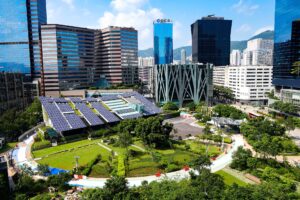Off-grid adventures have become increasingly popular among travelers seeking unique and sustainable travel experiences. The allure of self-sufficiency, combined with the desire to connect with nature, offers a compelling reason to explore destinations away from traditional tourist pathways. These off-grid destinations allow adventurers to embrace eco-friendly travel, engage in meaningful cultural exchanges, and experience unparalleled natural beauty. When planning your next journey, consider these top off-grid travel destinations for the self-sufficient traveler.
Tucked away in the heart of Central America, Costa Rica’s Osa Peninsula is an ecological paradise waiting to be explored. The rugged and remote landscape is home to one of the most biologically intense places on Earth: Corcovado National Park. Travelers can immerse themselves in lush rainforests, pristine beaches, and vibrant wildlife. Staying at an eco-lodge equipped with solar panels and rainwater collection systems means your visit leaves a minimal environmental footprint. Local guides offer invaluable insight into the conservation efforts aimed at preserving the park’s unique ecosystem, making this a rewarding experience for those interested in sustainability.
Next, consider exploring the enchanting Shetland Islands, situated at the northern tip of Scotland. With a rich cultural history deeply entwined with Norse folklore, these remote islands offer dramatic coastlines, rolling hills, and an abundance of wildlife, including the iconic Shetland ponies. Travel between islands on ferries operated by renewable energy sources, and stay in accommodation that prioritizes sustainable practices, such as energy-efficient heating and local food sourcing. Engage with the local community to learn about traditional crafts and the islands’ commitment to preserving their natural environment.
Journey to the far reaches of South America to discover Chilean Patagonia, a region renowned for its stunning landscapes and opportunities for outdoor adventure. Aysen, in particular, offers a remote retreat amid towering mountains, sprawling glaciers, and crystal-clear rivers. The Carretera Austral, a legendary road stretching southward, provides access to this remarkable wilderness. Inhabitants of this region have embraced off-grid living by using wind, solar, and micro-hydro technologies. Trekking the trails of Patagonia not only promises breathtaking vistas but also contributes to the local eco-tourism initiatives that protect these fragile environments.
For those intrigued by Arctic adventures, Svalbard, an archipelago located between mainland Norway and the North Pole, offers a unique off-grid experience. With its pristine glaciers, towering fjords, and roaming polar bears, Svalbard is the epitome of Arctic wilderness. Visitors can participate in activities like dog sledding and snowmobiling, all while staying in eco-conscious accommodations that utilize sustainable heating and power solutions. The archipelago’s commitment to preserving its delicate ecosystem is evident through strict regulations that ensure minimal human impact on the local environment.
Venturing eastward, the vast and remote regions of Mongolia offer an off-grid journey through the traditional lifestyle of the nomadic people. The expansive steppes, rolling deserts, and rugged mountains provide a stunning backdrop for an immersive cultural experience. Staying in a traditional ger with local families offers a glimpse into a lifestyle that has remained largely unchanged for centuries. Relying on solar-powered technology for energy and engaging in locally sourced meals facilitates a sustainable travel experience. The Mongolian nomads’ deep connection with nature and their land management practices provide a fascinating insight into living in harmony with the environment.
In the heart of the Atlantic Ocean, the Azores archipelago presents an idyllic setting for off-grid adventures. These volcanic islands boast lush landscapes, pristine lakes, and geothermal wonders. Island-hopping allows travelers to explore the distinct character of each of the nine islands, using environmentally friendly transport options. Accommodations throughout the Azores prioritize sustainability by harnessing geothermal energy and sourcing produce locally. Hiking trails lead through protected nature reserves, offering the chance to observe unique flora and fauna while promoting conservation efforts.
Far from the bustling crowds of city life, New Zealand’s Stewart Island offers a remote escape for nature lovers. Accessible by a short ferry ride from the South Island, the island is a haven for bird watchers and hikers. The Rakiura National Park encompasses about 85% of Stewart Island, providing endless opportunities for exploration. Off-grid accommodation options abound, from self-catering bungalows to eco-friendly lodges. Leveraging solar energy and rainwater harvesting, these establishments operate in harmony with the island’s natural surroundings. Guided tours provide educational insights into the island’s conservation efforts, as well as its rich Maori history.
The lure of Africa’s remote landscapes is undeniable, and Botswana’s Okavango Delta stands out as an unparalleled destination for off-grid enthusiasts. A UNESCO World Heritage Site, the delta is a rich tapestry of waterways, wildlife, and tranquility. Travelers can experience the wonder of the delta from a mokoro—a traditional dugout canoe—or on a guided walking safari. Eco-lodges in the delta employ solar power and sustainable water management systems, ensuring minimal impact on the environment. These lodges partner with local communities to support conservation and wildlife protection efforts, making your trip both eco-friendly and culturally enriching.
The remote wilderness of Alaska, USA, is another prime off-grid destination for the self-sufficient traveler. With its vast landscapes, abundant wildlife, and infinite outdoor activities, Alaska is ideal for those seeking solitude and adventure. The state offers numerous opportunities to engage with its pristine environment, from kayaking through untouched fjords to hiking in the Denali National Park. Many Alaskan accommodations operate off-grid, utilizing wind and solar power to cater to guests. By participating in guided eco-tours, travelers can contribute to conservation efforts, ensuring the preservation of Alaska’s natural heritage.
Lastly, the rugged beauty of Queensland’s Great Barrier Reef and Daintree Rainforest in Australia presents a captivating off-grid destination. Home to an extraordinary array of marine and terrestrial biodiversity, these World Heritage Sites appeal to eco-conscious adventurers. Stay in accommodations that harness solar energy and practice rainwater harvesting, ensuring a successful alignment with the region’s stringent environmental standards. Snorkeling or diving in the reef and hiking through ancient rainforest trails offer a sustainable travel experience, as these activities are regulated to protect the area’s natural beauty and biodiversity.
Embarking on an off-grid adventure presents an opportunity to challenge the norm, immerse yourself in nature, and connect with cultures in meaningful ways. These destinations highlight regions around the world committed to sustainable tourism practices, adopting innovative technologies, and fostering community-based conservation efforts. By choosing off-grid travel, adventurers support the preservation of some of the planet’s most majestic and vulnerable ecosystems. Whether exploring remote islands, vast tundras, or lush jungles, the call of the wild invites you to witness the unparalleled beauty and resilience of our world in its most unfiltered form.


